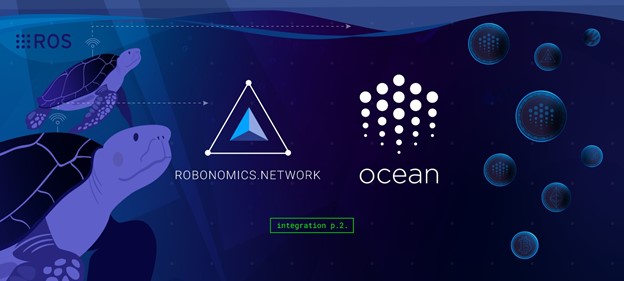It might sound like a scene from a sci-fi film, but the experts at Robonomics have unlocked the ability for robots to sell and buy data they gather in the field — autonomously! Utilizing the Ocean Protocol to secure and tokenize datasets, Robonomics — who have been pioneers in blockchain-enabled Internet of Things (IoT) and robotics research — have created an entirely new class of assets that were previously unavailable due to the inability to secure and exchange proprietary data.
For those who are not familiar with Ocean Protocol: the idea is to transform any data into a full-fledged asset by tokenization. It enables the buying and selling of data while simultaneously transferring ownership. Thus, it becomes possible to monetize tokenized data, create markets for them, while harnessing the full power of decentralized finance (DeFi) tools. Robonomics is an open-source, decentralized platform for IoT applications powered by Ethereum and Polkadot. In addition to the standard connectivity features, Robonomics provides functionality for creating a digital “twin” on the blockchain, a marketplace for robots, and other features of the “Robot Economy” concept, such as machine-to-machine (M2M) smart contracts.
Because Robonomics deeply understands automation — having developed open, decentralized platforms for robots and IoT control and communication — they have been able to not only utilize and monetize the activities of robots and devices but also enable them to communicate data and trade value between each other automatically. With Ocean Protocol, almost any device that generates and captures valuable data can be turned into a passive source of income for its owner, and with Robonomics, that same device can also become a subscriber and consumer of useful data to more effectively complete its tasks.
In order for Robonomics to work with many different types of devices, it utilizes the Robot Operating System (ROS), a middleware suite that allows users to conveniently deploy software for robotic devices. Thanks to ROS, it is quite easy to connect a new type of device to the network. The active ROS community has already developed hundreds of ready-to-use packages for various robots and IoT devices over the years.
One of the most interesting illustrations of such an application would be the tokenization of environmental data. The value of such data is only growing, taking into account the increasing interest of the population, companies and regulators in the problems of environmental management.
Robonomics has been working with environmental management and monitoring devices for several years. For example, the sensors-connectivity package was developed, which enables users of ROS-compatible sensors to turn them into telemetry agents. Robonomics engineers are developing various models of water drones to collect chemical indicators in rivers and lakes, and are also exploring the possibility of using UAVs to assess air quality.
In each case, the devices generate sensor and GPS logs, which are then published to IPFS and provided by the device as a result. This is where this data can be monetized; by creating a datatoken over Ocean Protocol. The Robonomics Network will ensure the data was collected by a specific robot for a specific task, and Ocean Protocol will ensure that only those who own the datatoken can access it.
Improving the algorithms driving robots also requires a thorough analysis of their operating data. This primarily is conducted using Machine Learning (ML), which requires datasets, but using a marketplace of tokenized data shared securely and automatically by devices, it is possible to combine useful datasets from devices operating in the same or similar environment to bolster data being fed into the ML algorithms. Monetization of such technical logs will be more field-specific, but the market value will be derived from their uniqueness and rarity.
While this valuable application of the given technology is perhaps the most rudimentary, the value unlocked by the tokenization of data and the markets it creates for corporations, governments and the public (as well as for robots) will ensure that countless new applications will appear in time. If interested in details, please refer to the report on the integration of ROS with OCEAN.
